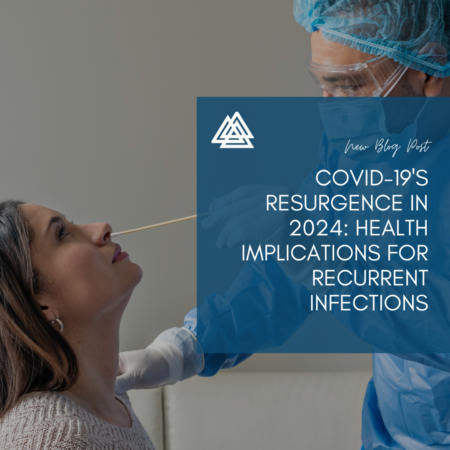 As 2024 unfolds, the global community finds itself grappling with a resurgence of COVID-19, marked by new challenges and evolving dynamics. Among these challenges is the phenomenon of recurrent infections, where individuals experience COVID-19 more than once. This scenario raises significant health implications and underscores the complex nature of our ongoing battle against the virus.
As 2024 unfolds, the global community finds itself grappling with a resurgence of COVID-19, marked by new challenges and evolving dynamics. Among these challenges is the phenomenon of recurrent infections, where individuals experience COVID-19 more than once. This scenario raises significant health implications and underscores the complex nature of our ongoing battle against the virus.
Understanding Recurrent Infections
Initially, COVID-19 was believed to offer some degree of immunity after recovery from a first infection or vaccination. However, the emergence of new variants, such as Delta and Omicron, has challenged this assumption. These variants possess mutations that can evade prior immunity, leading to instances where individuals who have recovered from COVID-19 or been vaccinated may still contract the virus again.
Health Implications
For those experiencing recurrent COVID-19 infections, several health implications arise:
- Risk of Severe Illness: Subsequent infections may lead to more severe disease outcomes, particularly if the immune response is compromised or if the individual has underlying health conditions.
- Long-Term Health Effects: The cumulative impact of multiple COVID-19 infections on long-term health is still being studied. Recurrent infections could potentially contribute to chronic health issues or exacerbate existing conditions.
- Psychological Impact: Dealing with multiple episodes of COVID-19 can take a toll on mental health, causing anxiety, stress, and uncertainty about future health outcomes.
Challenges in Management and Treatment
Managing recurrent COVID-19 infections poses challenges for healthcare providers and individuals alike:
- Diagnostic Challenges: Distinguishing between recurrent infections and lingering symptoms from previous infections can be difficult, requiring comprehensive testing and clinical evaluation.
- Treatment Strategies: There is a need for tailored treatment approaches for individuals experiencing recurrent infections, taking into account factors such as variant-specific immunity and potential changes in disease severity over time.
- Vaccination and Boosters: For those experiencing recurrent infections, vaccination and booster doses remain crucial. They can help strengthen immune responses and reduce the severity of subsequent infections.
Public Health Considerations
Addressing recurrent COVID-19 infections requires a multifaceted approach:
- Enhanced Surveillance: Monitoring cases of recurrent infections can provide insights into virus transmission dynamics and inform public health strategies.
- Continued Vaccination Efforts: Ensuring widespread access to vaccines and booster doses is essential in reducing the overall burden of COVID-19 and protecting vulnerable populations.
- Education and Awareness: Educating the public about the possibility of recurrent infections and emphasizing preventive measures, such as mask-wearing and hygiene practices, can help mitigate transmission risks.
The resurgence of COVID-19 in 2024, coupled with the challenge of recurrent infections, underscores the need for ongoing vigilance and adaptation in our response efforts. As we navigate this phase of the pandemic, it is crucial to prioritize public health measures, support ongoing research into COVID-19 immunity and variants, and provide comprehensive care for those affected.
